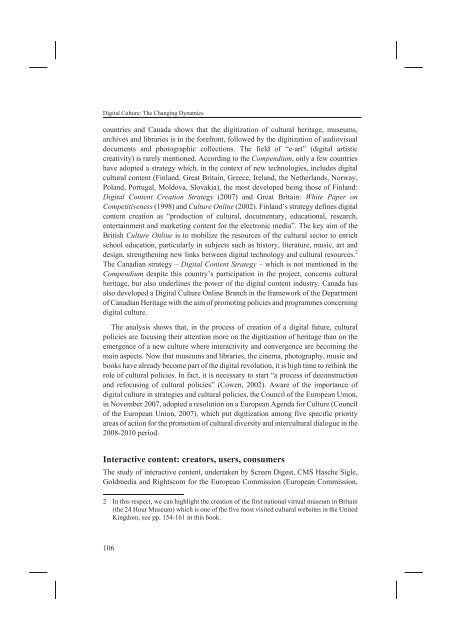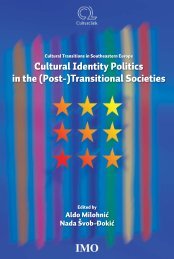D:\Documents and Settings\Ana\My Documents\Biserka-knjiga ...
D:\Documents and Settings\Ana\My Documents\Biserka-knjiga ...
D:\Documents and Settings\Ana\My Documents\Biserka-knjiga ...
You also want an ePaper? Increase the reach of your titles
YUMPU automatically turns print PDFs into web optimized ePapers that Google loves.
Digital Culture: The Changing Dynamics<br />
countries <strong>and</strong> Canada shows that the digitization of cultural heritage, museums,<br />
archives <strong>and</strong> libraries is in the forefront, followed by the digitization of audiovisual<br />
documents <strong>and</strong> photographic collections. The field of “e-art” (digital artistic<br />
creativity) is rarely mentioned. According to the Compendium, only a few countries<br />
have adopted a strategy which, in the context of new technologies, includes digital<br />
cultural content (Finl<strong>and</strong>, Great Britain, Greece, Irel<strong>and</strong>, the Netherl<strong>and</strong>s, Norway,<br />
Pol<strong>and</strong>, Portugal, Moldova, Slovakia), the most developed being those of Finl<strong>and</strong>:<br />
Digital Content Creation Strategy (2007) <strong>and</strong> Great Britain: White Paper on<br />
Competitiveness (1998) <strong>and</strong> Culture Online (2002). Finl<strong>and</strong>’s strategy defines digital<br />
content creation as “production of cultural, documentary, educational, research,<br />
entertainment <strong>and</strong> marketing content for the electronic media”. The key aim of the<br />
British Culture Online is to mobilize the resources of the cultural sector to enrich<br />
school education, particularly in subjects such as history, literature, music, art <strong>and</strong><br />
design, strengthening new links between digital technology <strong>and</strong> cultural resources. 2<br />
The Canadian strategy – Digital Content Strategy – which is not mentioned in the<br />
Compendium despite this country’s participation in the project, concerns cultural<br />
heritage, but also underlines the power of the digital content industry. Canada has<br />
also developed a Digital Culture Online Branch in the framework of the Department<br />
of Canadian Heritage with the aim of promoting policies <strong>and</strong> programmes concerning<br />
digital culture.<br />
The analysis shows that, in the process of creation of a digital future, cultural<br />
policies are focusing their attention more on the digitization of heritage than on the<br />
emergence of a new culture where interactivity <strong>and</strong> convergence are becoming the<br />
main aspects. Now that museums <strong>and</strong> libraries, the cinema, photography, music <strong>and</strong><br />
books have already become part of the digital revolution, it is high time to rethink the<br />
role of cultural policies. In fact, it is necessary to start “a process of deconstruction<br />
<strong>and</strong> refocusing of cultural policies” (Cowen, 2002). Aware of the importance of<br />
digital culture in strategies <strong>and</strong> cultural policies, the Council of the European Union,<br />
in November 2007, adopted a resolution on a European Agenda for Culture (Council<br />
of the European Union, 2007), which put digitization among five specific priority<br />
areas of action for the promotion of cultural diversity <strong>and</strong> intercultural dialogue in the<br />
2008-2010 period.<br />
Interactive content: creators, users, consumers<br />
The study of interactive content, undertaken by Screen Digest, CMS Hasche Sigle,<br />
Goldmedia <strong>and</strong> Rightscom for the European Commission (European Commission,<br />
2 In this respect, we can highlight the creation of the first national virtual museum in Britain<br />
(the 24 Hour Museum) which is one of the five most visited cultural websites in the United<br />
Kingdom, see pp. 154-161 in this book.<br />
106



